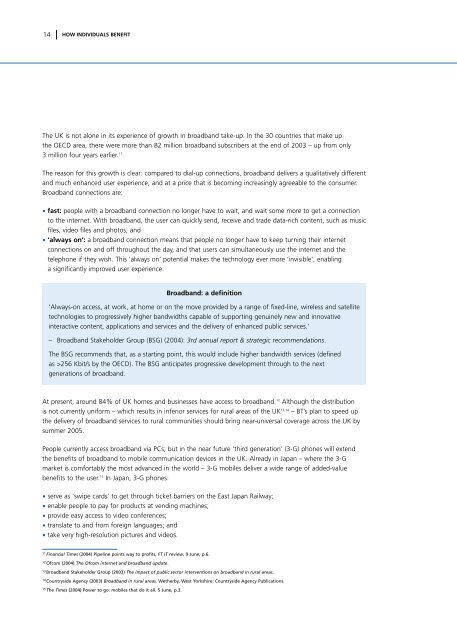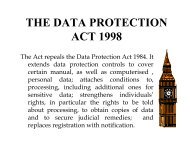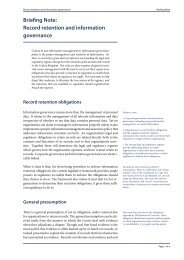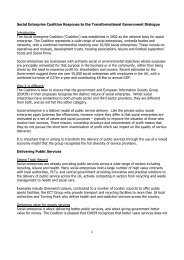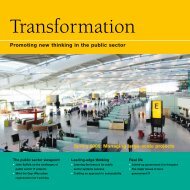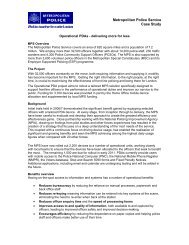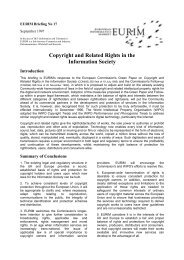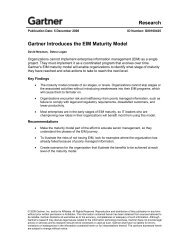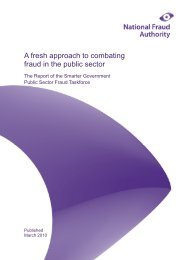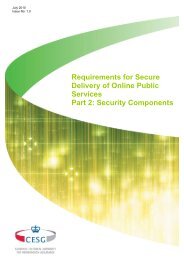Enabling a Digitally United Kingdom - Umic
Enabling a Digitally United Kingdom - Umic
Enabling a Digitally United Kingdom - Umic
You also want an ePaper? Increase the reach of your titles
YUMPU automatically turns print PDFs into web optimized ePapers that Google loves.
14 HOW INDIVIDUALS BENEFIT<br />
The UK is not alone in its experience of growth in broadband take-up. In the 30 countries that make up<br />
the OECD area, there were more than 82 million broadband subscribers at the end of 2003 – up from only<br />
3 million four years earlier. 11<br />
The reason for this growth is clear: compared to dial-up connections, broadband delivers a qualitatively different<br />
and much enhanced user experience, and at a price that is becoming increasingly agreeable to the consumer.<br />
Broadband connections are:<br />
• fast: people with a broadband connection no longer have to wait, and wait some more to get a connection<br />
to the internet. With broadband, the user can quickly send, receive and trade data-rich content, such as music<br />
files, video files and photos; and<br />
• ‘always on’: a broadband connection means that people no longer have to keep turning their internet<br />
connections on and off throughout the day, and that users can simultaneously use the internet and the<br />
telephone if they wish. This ‘always on’ potential makes the technology ever more ‘invisible’, enabling<br />
a significantly improved user experience.<br />
Broadband: a definition<br />
‘Always-on access, at work, at home or on the move provided by a range of fixed-line, wireless and satellite<br />
technologies to progressively higher bandwidths capable of supporting genuinely new and innovative<br />
interactive content, applications and services and the delivery of enhanced public services.’<br />
– Broadband Stakeholder Group (BSG) (2004): 3rd annual report & strategic recommendations.<br />
The BSG recommends that, as a starting point, this would include higher bandwidth services (defined<br />
as >256 Kbit/s by the OECD). The BSG anticipates progressive development through to the next<br />
generations of broadband.<br />
At present, around 84% of UK homes and businesses have access to broadband. 12 Although the distribution<br />
is not currently uniform – which results in inferior services for rural areas of the UK 13,14 – BT’s plan to speed up<br />
the delivery of broadband services to rural communities should bring near-universal coverage across the UK by<br />
summer 2005.<br />
People currently access broadband via PCs; but in the near future ‘third generation’ (3-G) phones will extend<br />
the benefits of broadband to mobile communication devices in the UK. Already in Japan – where the 3-G<br />
market is comfortably the most advanced in the world – 3-G mobiles deliver a wide range of added-value<br />
benefits to the user. 15 In Japan, 3-G phones:<br />
• serve as ‘swipe cards’ to get through ticket barriers on the East Japan Railway;<br />
• enable people to pay for products at vending machines;<br />
• provide easy access to video conferences;<br />
• translate to and from foreign languages; and<br />
• take very high-resolution pictures and videos.<br />
11 Financial Times (2004) Pipeline points way to profits, FT IT review, 9 June, p.6.<br />
12 Ofcom (2004) The Ofcom internet and broadband update.<br />
13 Broadband Stakeholder Group (2003) The impact of public sector interventions on broadband in rural areas.<br />
14 Countryside Agency (2003) Broadband in rural areas. Wetherby, West Yorkshire: Countryside Agency Publications.<br />
15 The Times (2004) Power to go: mobiles that do it all. 5 June, p.3.


